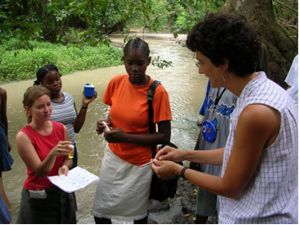|
published on 03/17/2006
Caribbean SEA Solves Water Issues
By
Caribbean Student Environmental Alliance
 |
| Mary Beth Sutton in Haiti |
From teaching students to fixing wells, Chattanoogans are working to get clean water to those who need it. Caribbean Student Environmental Alliance is a non profit organization whose mission it is to empower young people to protect their local environment which improves not only the health of their environment, but also their personal health through water related diseases. We work in conjunction with island organizations such as Lees Reef Project in Curacao, Laborie Community Development Foundation in St. Lucia, and the Rotary Club in Dominica. Many of our projects also receive support from the local electric utility! Our Caribbean SEA kids learn about the connections between freshwater, rainforests, and the coral reef ecosystems as well as how they personally can impact it. The students have planted trees to reduce erosion, tested water and informed their neighbors about it, cleaned up trash and started a Litter Patrol, and are working to install a Wastewater Garden to reduce the sewage being dumped into the sea. Our goal is that the students see the positive results of their actions and are empowered to take responsibility for caring for the environment.
In less developed countries like Haiti, water treatment and waste water treatment are often either very simple or not available. During the political unrest last year in Haiti, the Washington Post reported that gangs were using clean drinking water as a currency to control other people. Many folks in Chattanooga are involved in efforts to assist Haiti. Jeff Rogers lived there and provided ceramic water treatment containers for folks to reduce the pathogens in the water. Jim Roxlo, Northshore Rotary, works in Haiti with their local Rotarians to get the water wells working again just to supply freshwater to the people. Also in Haiti, the American Haitian Foundation and St. Augustine Church have built a school for children in the village of Petit Riviere and provided clean water piped from springs on the hillside above the school. Plans are in the works to install water treatment systems there as well.
(Contact Jack Davidson, American Haitian Foundation)
Arch Chemicals has long been in the business of treating water, but they now have expanded their efforts into rural communities which have little water treatment and where illness due to drinking untreated water is the leading cause of illness and death. Arch is installing simple water treatment systems and empowering the local people to be guardians of the clean water.( See attached article, contact Laura Tew, Arch Chemicals)
Chattanoogans are lucky that our founders located us on the banks of a beautiful river which provides our drinking water. We, too, must care for it so we dont lose this precious resource.
(From the World Water Day Website)
22 March - World Water Day 2006: Water and Culturehttp://www.unesco.org/water/wwd2006/index.shtml
Each year, a different United Nations (UN) agency is selected to coordinate events surrounding World Water Day around the world, and a different theme is chosen to reflect the many facets of freshwater resources. World Water Day 2006 will be guided by the United Nations Educational, Scientific and Cultural Organization under the theme 'Water and Culture.'
We plan our cities near water; we bathe in water; we play in water; we work with water. Our economies are built on the strength of water transportation - and the products we buy and sell are all partly water, in one way or another. Our daily lives are built on water, and shaped by it. Without the water that surrounds us - the humidity of the air, the roughness of the river's current, the flow from the kitchen tap - our lives would be impossible. In recent decades, water has fallen in our esteem. No longer an element to be revered and protected, it is a consumer product that we have shamefully neglected. Eighty percent of our bodies are formed of water, and two thirds of the planet's surface is covered by water: water is our culture, our life.
The theme 'Water and Culture' of WWD 2006 draws attention to the fact that there are as many ways of viewing, using, and celebrating water as there are cultural traditions across the world. Sacred, water is at the heart of many religions and is used in different rites and ceremonies. Fascinating and ephemeral, water has been represented in art for centuries - in music, painting, writing, cinema - and it is an essential factor in many scientific endeavors as well. Each region of the world has a different way of holding water sacred, but each recognizes its value, and its central place in human lives. Cultural traditions, indigenous practices, and societal values determine how people perceive and manage water in the world's different regions.
As the UN's focal point for the promotion of cultural diversity, UNESCO aims to preserve and respect the specificity of each culture, bringing them all together and extending them in a more interactive and interdependent world.
|



